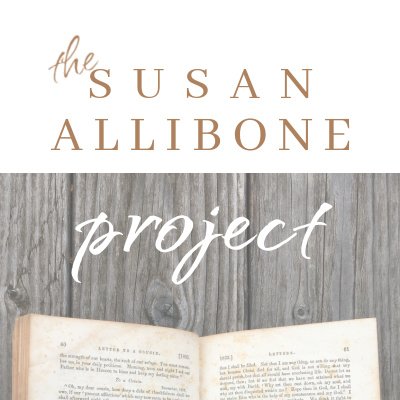The hymn for weary mothers
As I was annotating the memoir of Susan Allibone, I came across a line from a hymn that Susan quoted in a letter to her friend. I was marking the references to verses and poems she often included in her letters, so I typed that unfamiliar line into Google and went down a lovely rabbit trail to the story behind the hymn. I have never heard this hymn or it’s story, but what a treasure! I found the story of the hymn in an old book, English Hymns: Their Authors and History, and thought I’d retell it to you here because it is absolutely captivating.
Phoebe Hinsdale was born in NY on May 1, 1783 and was left an orphan at two years old. She never had more than three months of consecutive school instruction and was 18 before she learned to read. She married Timothy H. Brown, a house painter, and moved to Connecticut with him where they lived in poverty. They had four young children and lived in a small unfinished house, caring for a sick sister who lived in the only finished room. Here, amidst these hard circumstances, is where she started to write poetry.
Here is her story of how the poem, later revised into a hymn came about. The poem was titled “An Apology for my Twilight Rambles, Addressed to a Lady”:
“It was in Ellington that I wrote the ‘Twilight Hymn.’ My baby daughter was in my arms when I wrote it. I had been out on a visit to Dr. Hyde’s, and several were present. After tea one of my neighbors, who I had ever felt was my superior in every way, came and sat down near me, chatting with another lady without noticing me. Just as I was rising to go home, she turned suddenly upon me and said: ‘Mrs. Brown, why do you come up at evening so near our house and then go back without coming in? If you want anything, why don’t you come in and ask for it? I could not think who it was, and sent my girl down to the garden to see; and she said it was you that you came to the fence, but, seeing her, turned quickly away, muttering something to yourself.’
“There was something in her manner, more than her words, that grieved me. I went home, and that evening was left alone. After my children were all in bed except my baby, I sat down in the kitchen with my child in my arms, when the grief of my heart burst forth in a flood of tears. I took pen and paper and gave vent to my oppressed heart in what I called “My Apology for My Twilight Rambles, Addressed to a Lady.” It will be found in its original form in an old manuscript among my papers. In preparing it (some years after) for Nettleton’s Village Hymns (1824), some three or four verses were suppressed and a few expressions altered. In the original the first stanza was:
“I love to steal awhile away
From little ones and care.”
“This was strictly true. I had four little children, a small, unfinished house, a sick sister in the only finished room, and there was not a place, above or below, where I could retire for devotion without a liability to be interrupted. There was no retired room, rock, or grove where I could go as in former days, but there was no dwelling between our house and the one where that lady lived. Her garden extended down a good way below her house, which stood on a beautiful eminence. The garden was highly cultivated, with fruits and flowers. I loved to smell the fragrance of both (though I could not see them), when I could do so without neglecting duty; and I used to steal away from all within doors, and, going out of our gate, stroll along under the elms that were planted for shade on each side of the road. And as there was seldom any one passing that way after dark, I felt quite retired and alone with God. I often walked quite up that beautiful garden, and snuffed the fragrance of the peach, the grape, and the ripening apple, if not the flowers. I never saw any one in the garden, and felt that I could have the privilege of that walk and those few moments of uninterrupted communion with God without encroaching upon any one; but after once knowing that my steps were watched and made the subject of remark and censure, I never could enjoy it as I had done. I have often thought Satan had tried his best to prevent me from prayer by depriving me of a place to pray.”
I love this story. A weary mom and caregiver who would quietly step away when she could to spend time alone with God. Her priorities were right. Take care of her family and take care of her spiritual walk with God.
And even though her rude neighbor embarrassed her and Satan tried his best to prevent her from prayer, she continued to pray and raise her children for the Lord. She went on to publish several books, write many articles in newspapers, and to teach many more children through classes she prepared lessons for and taught, many of which were also published by the Massachusetts Sunday School Society. And eventually one of her sons became the first American missionary to Japan. The publisher of a hymn book reached out to her son to get the story behind the hymn. Below is an excerpt from the letter her son mailed:
“Her record is on high, and she is with the Lord, whom she loved and served as faithfully as any person I ever knew–nay more than any other. To her I owe all I am, and if I have done any good in the world, to her, under God, it is due. She seems, even now, to have me in her hands, holding me up to work for Christ and His cause with a grasp that I can feel. I ought to have been and to be a far better man than I am, having had such a mother.
Dear young moms, do not grow weary in doing good. Stay strong in the strength of the Lord by seeking “those few moments of uninterrupted communion with God.” Below is Phoebe’s poem, in its original form. Written by a poor, young mom and caregiver with a very busy life. Take notice of what she did and thought about in the times when she would steal away awhile.
AN APOLOGY FOR MY TWILIGHT RAMBLES, ADDRESSED TO A LADY
(Ellington, August, 1818.)
Yes, when the toilsome day is gone,
And night, with banners gray,
Steals silently the glade along
In twilight’s soft array,
I love to steal awhile away
From little ones and care,
And spend the hours of setting day
In gratitude and prayer.
I love to feast on Nature’s scenes
When falls the evening dew,
And dwell upon her silent themes,
Forever rich and new.
I love in solitude to shed
The penitential tear,
And all God’s promises to plead
Where none can see or hear.
I love to think on mercies past,
And future ones implore,
And all my cares and sorrows cast
On Him whom I adore.
I love to meditate on death!
When shall his message come
With friendly smiles to steal my breath
And take an exile home?
I love by faith to take a view
Of blissful scenes in Heaven;
The sight doth all my strength renew,
While here by storms I’m driven.
I love this silent twilight hour
Far better than the rest;
It is, of all the twenty-four,
The happiest and the best.
Thus, when life’s toilsome day is o’er,
May its departing ray
Be calm as this impressive hour
And lead to endless day.
You can read the whole letter her son sent to the publisher of her hymn here.
It is on page 6 of the PDF.
You can hear the hymn here (it has been edited from her original poem).
You can purchase a copy of the memoir of Susan Allibone on Amazon.





Oh that I would love to meditate on death! I pray that I am filled with anticipation for what awaits for me in heaven! This is so encouraging!
I’ve been waiting for this blog post hehe! Thank you!
“I love to think on mercies past,
And future ones implore,
And all my cares and sorrows cast
On Him whom I adore.”
💛💛💛
Love this post! What a treasure! I’m going to print the poem to have in my Bible – such a reminder that in the hard seasons, we can rejoice in the presence of our Lord. And oh the phrase “the friendly smile of death” – wow, that we Christians would truly rejoice to know we are heading home. Thank you!